
Summer is the perfect time to take a relaxing break from the great big (sometimes burdensome) world and lose yourself in a good book.
What to read? We checked out the Jewish Book Council at www.jewishbookcouncil.org – and came away with an enticing list of books with Jewish content or Jewish themes that were published in 2018/2019. So, pull up a beach chair, pop open the beach umbrella…and start reading.
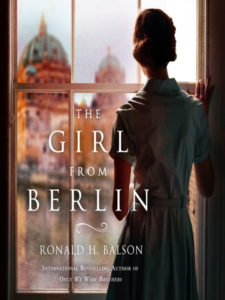 The Girl from Berlin
The Girl from Berlin
By Ronald H. Balson
Fiction (2019)
2018 National Jewish Book Awards Winner
Seventy-eight-year-old Gabrielle Vincenzo has been given 60 days to vacate her villa in the Tuscan hills. Her 70-acre property is surrounded by vineyards owned by one of Italy’s largest wine producers. VinCo claims it has legal title to Villa Vincenzo and the Italian court has granted it possession. Into this story come Catherine Lockhart and Liam Taggart, a Chicago lawyer and private investigator team hired to assist her in fighting to keep her home. The key to resolving the mystery of Gabrielle’s attachment to the property, and her rightful ownership of the villa and land, lies in the memoir of Ada Baumgarten, a young virtuoso violinist who comes of age in Berlin in the 1930s. Ada’s tale and the story of Gabrielle’s legal battle are woven into a suspenseful novel that illuminates the cruelty and horror of Nazi Germany and the heroism of ordinary people.
 The Book of Dirt
The Book of Dirt
By Bram Presser
Historical fiction (2018)
2018 National Jewish Book Award for Debut Fiction
The Book of Dirt is the memoir that could never be written because “everyone you care about in this book is dead.” This type of direct prose permeates the novel and is so beautifully executed that it authenticates the voices Presser seeks to awaken. The story is the mystery of Jakub Rand, the chronicler of Jewish books for the Nazis’ planned Museum of the Extinct Race. It is the story of Frantiska Roubickova, who watches her mischlinge (mixed) daughters taken away by the Nazis. And it is the story of two courageous sisters who embraced life in the face of intolerable challenges.
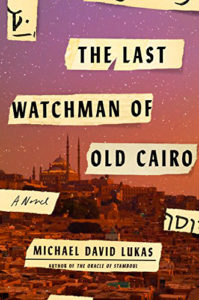 The Last Watchman of Old Cairo
The Last Watchman of Old Cairo
By Michael David Lukas
Fiction (2018)
2018 Sami Rohr Prize Winner 2019
From the moment Joseph, a graduate student in literature and the son of a Jewish mother and Muslim father, receives a gift from his late father, the adventure to uncover the past begins. Part family quest, part detective story, Lukas’s novel toggles between Cairo in the 11th and 19th centuries and the present day, to create a captivating story detailing the history of Cairo’s Ibn Ezra Synagogue, its treasures, and the divisions among people in its midst.
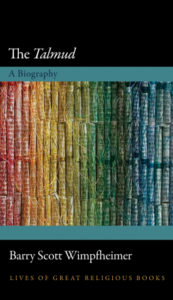 The Talmud: A Biography
The Talmud: A Biography
By Barry Scott Wimpfheimer
Non-fiction (2018)
National Jewish Book Award 2018
A portrayal of the multiple aspects of what is at least the second most important work in the Jewish canon. Wimpfheimer subjects the Talmud to careful academic critical analysis. His work examines the technical legal arguments that underpin some of the work, puts its stories (“Agadata”) in perspective, and describes the sociological and historic impact of the Talmud. Although part of the discussion is somewhat technical, the work demonstrates the evolution of Talmudic analysis from the original text to subsequent commentaries by repeatedly examining one particular section that deals with property damaged by fire.
 The Falconer
The Falconer
By Dana Czapnik
Fiction (2019)
New York, 1993. Seventeen-year-old Lucy Adler, a street-smart, trash-talking baller, is often the only girl on the public courts. Insecure and self-possessed, she is in unrequited love with her best friend Percy, scion of a prominent New York family. As Lucy navigates this complex relationship in all its youthful heartache and prepares for life in the broader world, she begins to question accepted notions of success, bristling against her own hunger for male approval and searching for an authentic way to live and love. A snapshot of the city’s youth as they grapple with privilege and the fading of radical hopes and paints a captivating portrait of a young woman in the first flush of freedom.
 Color Me In
Color Me In
By Natasha Diza
Fiction (2019)
Growing up in an affluent suburb of New York City, 16-year-old Nevaeh Levitz never thought much about her biracial roots. When her black mom and Jewish dad split up, she relocates to her mom’s family home in Harlem and is forced to confront her identity for the first time. Meanwhile, Nevaeh’s dad decides that she should have a belated bat mitzvah, which guarantees social humiliation at her posh private school. Even with the push and pull of her two cultures, Nevaeh does what she’s always done when life gets complicated: she stays silent. It’s only when she stumbles upon a secret from her mom’s past, finds herself falling in love, and sees firsthand the prejudice her family faces that she begins to realize she has a voice.
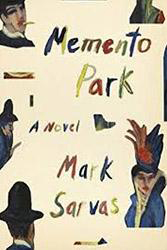 Memento Park: A Novel
Memento Park: A Novel
By Mark Sarvas
Fiction (2018)
Sami Rohr Prize Fellow 2019
After receiving an unexpected call from the Australian consulate, Matt Santos becomes aware of a painting that he believes was looted from his family in Hungary during the Second World War. To recover the painting, he must repair his strained relationship with his harshly judgmental father, uncover his family history, and restore his connection to his own Judaism. Along the way to illuminating the mysteries of his past, Matt is torn between his doting girlfriend, Tracy, and his alluring attorney, Rachel, with whom he travels to Budapest to unearth the truth about the painting and, in turn, his family. By the time Memento Park reaches its conclusion, Matt’s narrative is as much about family history and father-son dynamics as it is about the nature of art itself, and the infinite ways we come to understand ourselves through it.
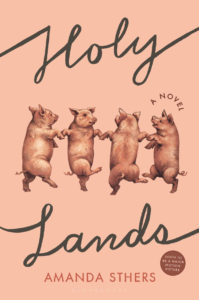 Holy Lands
Holy Lands
By Amanda Sthers
Non-fiction (2019)
Harry Rosenmerck is an aging Jewish cardiologist who has left his thriving medical practice in New York – to raise pigs in Israel. His ex-wife, Monique, ruminates about their once happy marriage even as she quietly battles an aggressive illness. Their son, David, an earnest and successful playwright, has vowed to reconnect with his father since coming out. Annabelle, their daughter, finds herself unmoored in Paris in the aftermath of a breakup. Harry eschews technology, so his family, spread out around the world, must communicate with him via snail mail. Holy Lands captures the humor and poignancy of an adult family striving to remain connected across time, geography, and radically different perspectives on life.
Greenhorns: Stories
By Richard Slotkin
Semi-fictional (2018)
The six stories in this collection explore the greenhorn experience in the context of Jewish immigration to the United States, particularly to New York City, from the turn of the 20th century through the early years of the Great Depression. Slotkin has based his tales on interviews he held with family members who came to the United States from Russia and Poland between 1900 and 1921. These tales recover the violent circumstances, the emotional and psychological costs of uprooting, which left the immigrant uncertain of his place in America, and show how that uncertainty shaped the lives of their American descendants.
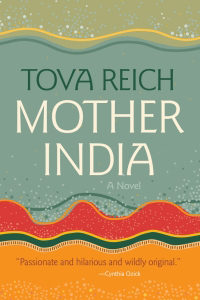 Mother India
Mother India
By Tova Reich
Fiction (2018)
National Jewish Book Awards Finalist 2018
Written with intimacy, and occasionally even brutal honesty, Mother India follows the experiences of three generations of Jewish women who go to India in search of transformation and transcendence. They want to know if it’s possible to gain what they call “eternal release from the profound suffering of life.” Witty and satirical, the writing has bite. We come to love and identify with narrator Meena Sati, formerly Meena Tabor of Brooklyn, an American woman who attempts to make India her spiritual and physical home. Deeply original, profoundly funny, and darkly satisfying, Mother India is a perfect book club read.
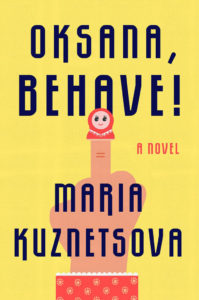 Oksana, Behave!
Oksana, Behave!
By Maria Kuznetsova
Fiction (2019)
When Oksana’s family begins their new American life in Florida after emigrating from Ukraine, her physicist father delivers pizza at night to make ends meet, her depressed mother sits home all day worrying, and her flamboyant grandmother relishes the attention she gets when she walks Oksana to school, not realizing that the street they’re walking down is known as Prostitute Street. Oksana just wants to have friends and lead a normal life – and though she constantly tries to do the right thing, she keeps getting herself in trouble.
As she grows up, she continues to misbehave, from somewhat accidentally maiming the school bus bully, to stealing the much-coveted (and expensive-to-replace) key to New York City’s Gramercy Park, to falling in love with a married man. As her grandmother moves back to Ukraine, her father gets a job at Goldman Sachs, and her mother knits endless scarves, Oksana longs for a Russia that looms large in her imagination but is a country she never really knew.
When she visits her grandmother in Yalta and learns about Baba’s wartime past and her lost loves, Oksana begins to see just how much alike they are, and comes to a new understanding of how to embrace life and love without causing harm to the people dearest to her. But will Oksana ever quite learn to behave?
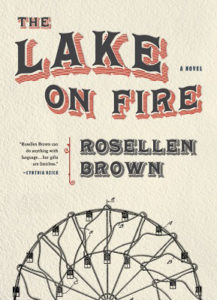 The Lake on Fire
The Lake on Fire
Rosellen Brown
Fiction (2018)
The Lake on Fire is an epic narrative that begins among 19th-century Jewish immigrants on a failing Wisconsin farm. Dazzled by lore of the American dream, Chaya and her strange, brilliant, young brother Asher stow away to Chicago; what they discover there, however, is a Gilded Age as empty a façade as the beautiful Columbian Exposition luring thousands to Lake Michigan’s shore. The pair scrapes together a meager living ― Chaya in a cigar factory; Asher, roaming the city and stealing books and jewelry to share with the poor, until they find different paths of escape. An examination of family, love, and revolution, this profound tale resonates eerily with today’s current events and tumultuous social landscape. The Lake on Fire is robust, gleaming, and grimy all at once, proving that celebrated author Rosellen Brown is back with a story as luminous as ever.
 Spies of No Country: Secret Lives at the Birth of Israel
Spies of No Country: Secret Lives at the Birth of Israel
By Matti Friedman
Non-fiction
This tale of Israel’s first spies reads like an espionage novel – but it’s all true. The four agents at the center of this story were part of a ragtag unit known as the Arab Section, conceived during World War II by British spies and Jewish militia leaders in Palestine. Intended to gather intelligence and carry out sabotage operations, the unit consisted of Jews who were native to the Arab world and could thus easily assume Arab identities. In 1948, with Israel’s existence in question, these men went undercover in Beirut, where they spent the next two years operating out of a newsstand, collecting intelligence and sending messages back to Israel. Of the dozen spies in the Arab Section at the war’s outbreak, five were caught and executed. But in the end, the Arab Section would emerge as the nucleus of the Mossad, Israel’s vaunted intelligence agency.
 Wild Milk: Stories
Wild Milk: Stories
By Sabrina Orah Mark
Fiction (2018)
In this collection of surreal stories, familiar Jewish narratives – involving rabbis, warding off the ayin hara, the Holocaust, and the receiving of the commandments – are reexamined through unexpected lenses: social media, children’s songs, American politics, a pretend film. Mark’s use of Jewish culture and contemporary fairy tales combine into stories that challenge both discourses. By defying the cultural boundaries of American fairy tales, Mark gives us a collection that casts both mainstream and minority cultures in a new, wild light.
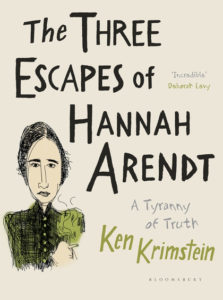 The Three Escapes of Hannah Arendt: A Tyranny of Truth
The Three Escapes of Hannah Arendt: A Tyranny of Truth
By Ken Krimstein
(2018)
National Jewish Book Awards Finalist 2018
One of the greatest philosophers of the 20th century and a hero of political thought, the largely unsung and often misunderstood Hannah Arendt is best known for her landmark 1951 book on openness in political life, The Origins of Totalitarianism. She led an extraordinary life. This was a woman who endured Nazi persecution firsthand, survived harrowing “escapes” from country to country in Europe, and befriended such luminaries as Walter Benjamin and Mary McCarthy, in a world inhabited by everyone from Marc Chagall and Marlene Dietrich to Albert Einstein and Sigmund Freud. A woman who finally had to give up her unique genius for philosophy, and her love of a very compromised man – the philosopher and Nazi-sympathizer Martin Heidegger – for what she called “love of the world.” A portrait of a complex, controversial, deeply flawed, and courageous woman whose intelligence and “virulent truth telling” led her to breathtaking insights into the human condition, and whose experience continues to shine a light on how to live as an individual and a public citizen in troubled times.
Scholarly Man of Faith: Studies in the Thought and Writings of Rabbi Joseph B. Soloveitchik
By Ephraim Kanarfogel
Edited by Dov Schwartz
Non-fiction (2018)
This collection of academic papers on the teachings of Rabbi Joseph B. Soloveitchik developed from a joint conference that took place in 2012 at Yeshiva University in New York and Bar Ilan University in Tel Aviv. (A companion volume of Hebrew-language papers from the conference is forthcoming.) Reflecting the Torah U’madda (Torah and secular knowledge) polymath that R. Soloveitchik himself embodied, the papers represent many disciplines, all viewed from both a Jewish and secular perspective, including philosophy, hermeneutics, history, and literature.







 Southern New England Jewish Ledger
Southern New England Jewish Ledger













